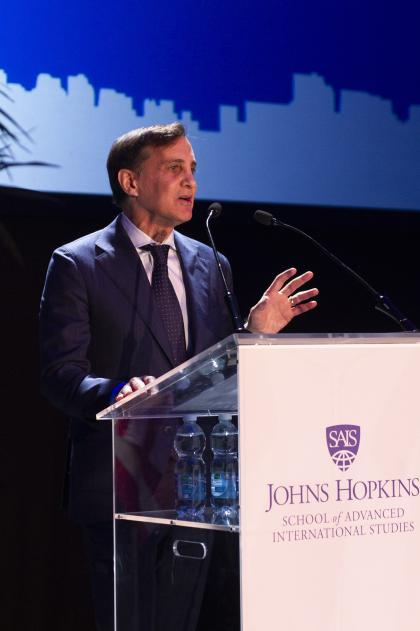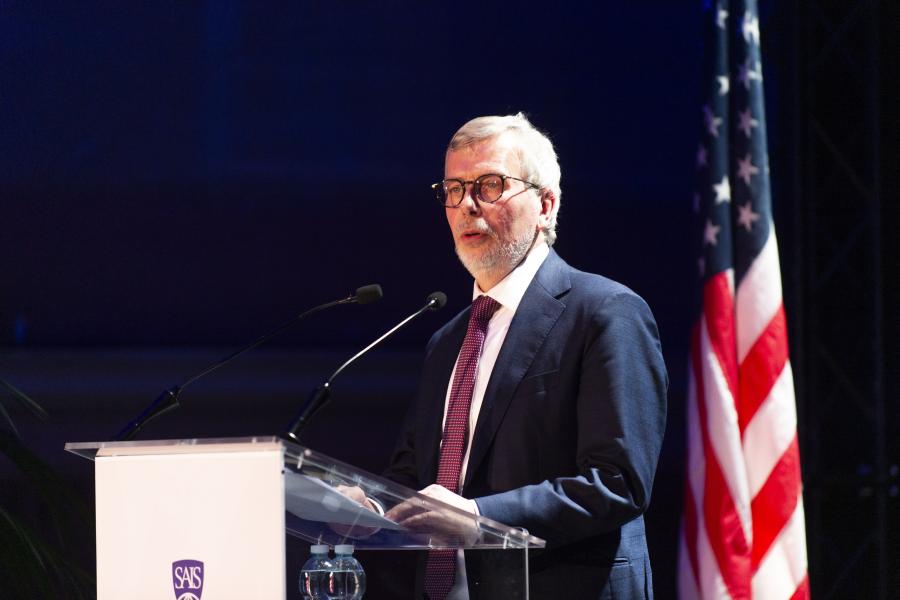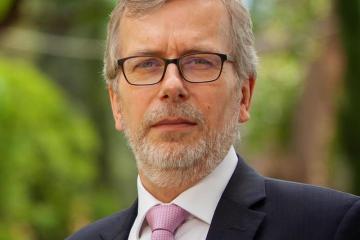The Johns Hopkins SAIS Europe community convened in the heart of Bologna, Italy, on Wednesday to welcome Renaud Dehousse to his new role as the inaugural rector of SAIS Europe and vice dean of SAIS.
International journalist Barbara Serra served as master of ceremony, introducing a roster of esteemed speakers including Alejandra Flores Renteria, SAIS Europe student and student body president; Matteo Lepore, mayor of Bologna; Giovanni Molari, rector of the University of Bologna; Vera Zamagni, SAIS Europe senior adjunct professor; Jack Markell, U.S. ambassador to Italy; James B. Steinberg, dean of SAIS; and Johns Hopkins University President Ron Daniels.

Image caption: Ron Daniels
Image credit: Anna Fantuzzi for Johns Hopkins University
"We are thrilled to welcome Renaud Dehousse to Johns Hopkins at this important moment for SAIS Europe and the global society we serve," Daniels said. "A scholar and leader with decades of experience bringing impactful research to the public square, he will be critical in forging connections across every part of our university and further expanding SAIS Europe's role as a vibrant hub for education, research, public policy formation, and cross-cultural dialogue."
Speakers at the event reflected on the profound importance of cross-cultural collaboration in academia and the longstanding partnership among Johns Hopkins, the University of Bologna, and the city of Bologna.
"Our center here in Bologna, founded nearly 70 years ago, was similarly inspired by the importance of sustaining a deep transatlantic link connecting both policymakers and scholars on both sides of the Atlantic, as together we faced the challenges of the Cold War and the need to defend democracy and freedom," Steinberg said. "Today the continued importance of this mission is clear and perhaps more important than ever."
In his remarks, Dehousse echoed Steinberg's sentiments, emphasizing the importance of institutions like SAIS Europe in a world where tensions and distrust run high among global players and their citizenry. "We now witness the emergence of a multipolar world, a world in which the Western worldview faces many challenges, as was evident in reactions from the global South to the Russian aggression against Ukraine," he said. "Despite this increasing polarization, global cooperation remains imperative to address a number of challenges like climate change or the exponential growth of technology."
Dehousse said he sees SAIS Europe as a positive force against such division: "Political communities are constructs where maintaining a sense of community is essential in a partnership. As cooperation becomes more challenging, understanding the viewpoints of the other side becomes increasingly important. Needless to say, institutions of learning may play a key role at this level by fostering mutual knowledge. And yes, let me say that SAIS Europe intends to play its part in this cultural endeavor."
Before becoming European University Institute president, Dehousse was a professor and holder of the Jean Monnet Chair of European Law and Policy Studies at Sciences Po Paris, where he founded and directed the Centre for European Studies. He chaired Sciences Po's board from 2013 to 2016.
After studying law at the University of Liège in Belgium, he obtained a doctorate at the European University Institute. Before joining Sciences Po in 1999, he taught at the European University Institute, then at the University of Pisa. He was a visiting professor at the Universities of Florence (Cesare Alfieri), Cologne, Rome (LUISS), Lausanne, the College of Europe, and at the University of Michigan Law School.
SAIS Europe was founded in 1955 with a focus on international affairs and the frameworks for transnational cooperation and peace at a critical moment in the development of the post-war world order. Today, SAIS Europe's campus location in Bologna offers a unique bridge to different parts of the world, not only in direct partnership with SAIS' flagship campus in Washington, D.C., and longstanding program in Nanjing, China, but also at the intersection of academic, research, and convening activities in Europe, neighboring countries in Africa and the Mediterranean basin, and beyond.???
Image credit: Anna Fantuzzi for Johns Hopkins University
Posted in University News
Tagged sais europe









